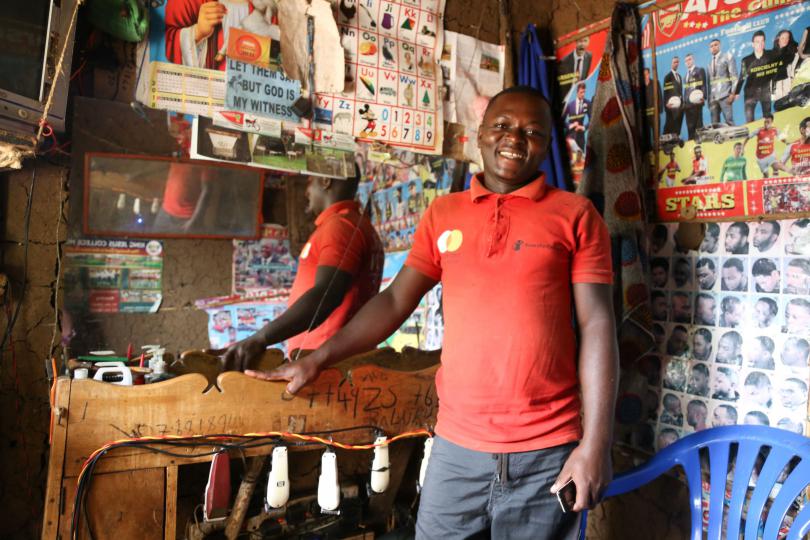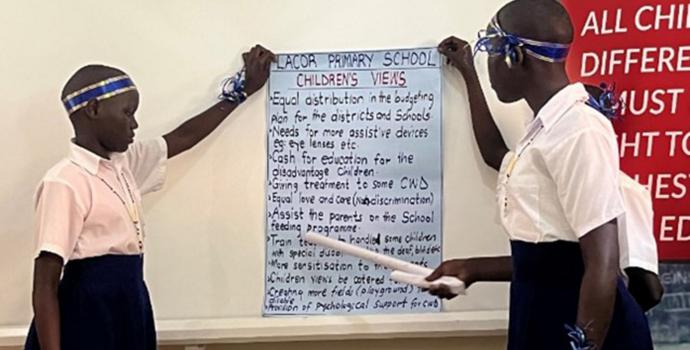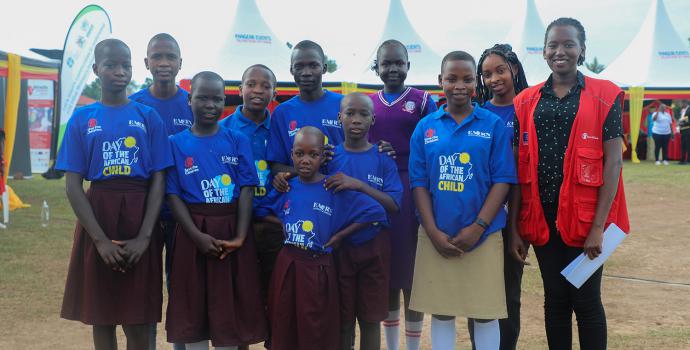Beekeepers create a buzz in western Uganda
Early every morning John Baluku puts on his protective gear and walks through the lush green fields of Ntoroko, western Uganda, to check on his beehives.
“I visit three times a day to stop the red ants getting into the hive. I set smoke and they run away. The birds with long necks also come and eat the bees and take the honey. Through Youth in Action I learnt how to protect the hives.”
A few years ago John didn’t know anything at all about bees, other than that he liked the taste of honey.
“I dropped out of school in the first year of secondary because we had no money,” he says. “I started moving around the trading centres, looking for work so that I could eat.”
One day in 2013 he was listening to his favourite local radio station and heard an advert for a new programme called Youth in Action – a partnership between Save the Children and The Mastercard Foundation to help rural youth start their own small businesses.
John was 18 years old and applied the next day.
“We got the choice of receiving money to start a business straight away, or going for training. I chose the training. I was attached for mentorship at Bunyangabu Beekeepers’ Cooperative (BBC). They took us on learning visits to apiaries (where bees are kept) so we could see how to do it.”
Beekeeping is still new in Ntoroko district, and John didn’t know anyone else who was doing it.
“After three months’ training we were put in groups and helped to do a business plan. The group started with seven people but went down to three. As youth we often want things quickly, we’re not patient. I think the others wanted to get rich fast!”
The programme gave the group start-up capital of about US$ 600, with which they bought six beehives and other materials.
“I saw an opportunity to make money from beekeeping. To me it seemed the most viable option,” says John.
John harvests his honey and beeswax three times a year. For his first harvest John sold 13kgs of honey from his two hives, at 8,000 shillings per kilo. The second harvest he sold a bit less – just 8kgs sold at 7,000 shillings per kilo. Business was ok but fairly slow. John got married and started a family, so was keen to expand.
BBC invited him back for further training, and linked him up with SKY-AVIS, a local youth skilling organisation, which saw potential in him and helped him get another eight beehives. “I then bought another with the money I’d saved, so I had 11 in total.”
The Youth in Action programme ended in 2018 and helped more than 11,050 rural Ugandan youth to find decent work. But it aims to have a long-term impact...
So what has happened since?
Two years later we caught up with John again. When Youth in Action ended, John had 15 beehives. Today he has 26, and keen to get more. “I’m told a good beekeeper has 30 hives!” he says.
Now 25 years-old, he’s built two new homes with the profits – a good house for his family, and a smaller room at the trading centre so that he can stay overnight to sell in the market. He now has five children – the youngest born this year and the eldest son, aged 6, about to enrol in school. John says the money from beekeeping means he can afford the school fees.
“I had a dream to build a permanent house, and finally I could afford to! I also bought three acres of land, where I plant cocoa and bananas. At primary school I had a dream to be either a lawyer or a good farmer. If I can’t be a lawyer, then I can still be a farmer!”

Above: John (right) outside his new family home with Save the Children staff member John Mateso (left)
John recently sat his DIT (Directorate of Industrial Training) exam so that he can be a fully certified beekeeper. He leads apiary farmer for the local government, BBC and SKY-AVIS and as Chair of the apiary farmers in Ntoroko he has trained 90 more young farmers in the area.
“Beekeeping isn’t difficult, but the big challenge is the rain. Or too much sun. Last year’s harvest was badly affected by the rain. It’s also a lot of work. It takes 10 hours to make a hive.”
John has dipped into several other businesses. He started a barber shop in the local market, which has also thrived (pictured below).
Not all have worked though. “I bought a satellite dish so I could start showing football matches at the trading centre (and charging a small fee to watch). It was going well but then the dish was stolen in a robbery.” Some of the early 2020 harvest was lost when the boda-boda motorbike that he was using to transport the goods was involved in an accident, and more than 20kgs of honey spilled into the road.
But for each setback there have been multiple successes, and John’s future is buzzing.





